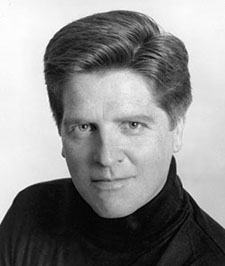The Wagner Society's 13th Emerging Singer Concert
Last Friday, members of the Washington Wagner Society, Wagnerians, and a few people who love Wagner got together for their 13th Evelyn Lear & Thomas Stewart Emerging Singers Concert at the German Embassy which was turned into a Thomas Stewart memorial event after his death on September 24th.Without his involvement, efforts, and energy, the Emerging Singers program would never have been what it is – or more likely never been at all. Introduced by an emotional Evelyn Lear, the performances (opera excerpts accompanied on the piano by Ms. Betty Bullock) were much more to the listeners than just variously successful interpretations of Elisabeth, Lohengrin, Sieglinde, Amfortas, et al. – they were tear-moist memories to a great Wagnerian and teacher who was with the performers and the audiences in heart and mind.
But even with the special event the concert constituted, the hyperbole of Ms. Lear (“Have you ever heard such a great performance of XYZ in any opera house in the world? I haven’t…”) didn’t ring true – and neither did the uncritical applause of the audience which had an excited cheerleader in the form of Mark J. Estren in their midst. (His review for the Washington Post can be read here.)
 Soprano Kara Harman started things off with “Dich, teure Halle” from Tannhäuser and proved to be successfully loud, if nothing else. Her gestures were ridiculous stock-phrases that I thought we’d gotten over 30, 40 years ago. There was no sense of bel canto, no ability to reduce the voice in “Sei mir gegrüsst!” – and for the most part no attempt, either. It was, in short, a collection of Wagner clichés, screamed with moderate beauty, straight at the audience. Isolde’s Liebestod was not a lot better. Lack of legato but plenty exaggerations, always lack of softness, unsubtle diminuendi at “ertrinken, versinken” (but at least some diminuendo), lack of breath control (“mild versöhnend – inhale – aus ihm tönend”), and the last note (“Lust”) ever so slightly flat… it would have been reasonably enjoyable – but being told that it was the “best Liebestod we could have heard in any opera house imaginable” soured the last bit of appreciation I could have mustered. “Du bist der Lenz” from Act 1 of Die Walküre had two shrill moments (“erblÜTHE”, “an mein OHR”) and the last line’s loudness (“zuerst ich den Freund ersah”) seemed aimed to impress only. Otherwise there was little to criticize.
Soprano Kara Harman started things off with “Dich, teure Halle” from Tannhäuser and proved to be successfully loud, if nothing else. Her gestures were ridiculous stock-phrases that I thought we’d gotten over 30, 40 years ago. There was no sense of bel canto, no ability to reduce the voice in “Sei mir gegrüsst!” – and for the most part no attempt, either. It was, in short, a collection of Wagner clichés, screamed with moderate beauty, straight at the audience. Isolde’s Liebestod was not a lot better. Lack of legato but plenty exaggerations, always lack of softness, unsubtle diminuendi at “ertrinken, versinken” (but at least some diminuendo), lack of breath control (“mild versöhnend – inhale – aus ihm tönend”), and the last note (“Lust”) ever so slightly flat… it would have been reasonably enjoyable – but being told that it was the “best Liebestod we could have heard in any opera house imaginable” soured the last bit of appreciation I could have mustered. “Du bist der Lenz” from Act 1 of Die Walküre had two shrill moments (“erblÜTHE”, “an mein OHR”) and the last line’s loudness (“zuerst ich den Freund ersah”) seemed aimed to impress only. Otherwise there was little to criticize.
 Tenor Jeffrey Springer sang Lohengrin’s “In fernem Land”, Parsifal’s “Nur eine Waffe taugt”, and the Preislied from Die Meistersinger. The stiffness and inflexibility of his singing was not made up for with the sheer volume he can sing with. (As if singing loud were tantamount to singing Wagner well… especially in small places.) The portamentos at “es heist der GRAL” and “Vom Gral ward ich…” were questionable, at “Tugend Recht ernannt” the unidiomatic pronunciation was slurred, there was no sweetness at all in the lines from “Wer nun dem Gral zu dienen ist erkoren” on, “von einer Engelschar gebracht” wasn’t taken back even a little, “höchstes Heiligtum bewacht” needed an extra breath, and a few phrases were flat. On the other hand, the phrasing of “– dann muss er von euch ziehn” was delicate and very well rendered. As Parsifal, “Quelle” (spring) and “Welle” (wave) turned into “quäle” (torture) and “wähle” (chose) while the poses he struck were abominable (extended arm, shaking from stiffness and tension). And this was already better than the Lohengrin. During the Prize-song from the Meistersinger, Sachs could have finished more shoes than a Vietnamese child laborer had he marked every oddly pronounced word or clunky phrase. Little of it was sung, much of it was screamed. The last line of “Parnass und Paradies!” was a booming howl.
Tenor Jeffrey Springer sang Lohengrin’s “In fernem Land”, Parsifal’s “Nur eine Waffe taugt”, and the Preislied from Die Meistersinger. The stiffness and inflexibility of his singing was not made up for with the sheer volume he can sing with. (As if singing loud were tantamount to singing Wagner well… especially in small places.) The portamentos at “es heist der GRAL” and “Vom Gral ward ich…” were questionable, at “Tugend Recht ernannt” the unidiomatic pronunciation was slurred, there was no sweetness at all in the lines from “Wer nun dem Gral zu dienen ist erkoren” on, “von einer Engelschar gebracht” wasn’t taken back even a little, “höchstes Heiligtum bewacht” needed an extra breath, and a few phrases were flat. On the other hand, the phrasing of “– dann muss er von euch ziehn” was delicate and very well rendered. As Parsifal, “Quelle” (spring) and “Welle” (wave) turned into “quäle” (torture) and “wähle” (chose) while the poses he struck were abominable (extended arm, shaking from stiffness and tension). And this was already better than the Lohengrin. During the Prize-song from the Meistersinger, Sachs could have finished more shoes than a Vietnamese child laborer had he marked every oddly pronounced word or clunky phrase. Little of it was sung, much of it was screamed. The last line of “Parnass und Paradies!” was a booming howl.
I go into perhaps inane detail to avoid the accusation that I dismiss these singers’ earnest efforts and surely impressive capabilities off hand or without reason or justification. And I may have brushed over much of the gruesome details had there not been the constant barrage of “wasn’t this just the best, ever!”. No, it wasn’t. It was no more than would expect from a local group of Wagnerians who show off a few vocal talents. Or at least it would have been just that, had it not been for baritone Jason Stearns and – despite one large caveat – Ms. Deidra Gorton’s dramatic soprano.
 Jason Stearns was much touted as Thomas Stewart’s favorite and reminding Evelyn Lear much of her late husband. If that sounded like another setup for disappointment, the first few lines in Wotan’s “Abendlich strahlt der Sonne Auge”, convinced at once. A beautiful piano (!), nuance (!), very decent pronunciation, numerous smart touches (“ward sie gewonnen”, “so grüss ich die BURG”) made this by far the best performance of the evening and one that no opera house would be ashamed of having heard from its stage. I was not quite as impressed with his Amfortas where he sounded a little more muffled, could have done more to give “götlichem Glanz den Erlöser selbst erschaust” a transfigured touch, but at least he had that essential tool that was missing utterly from his two colleagues’ set of abilities: nuance. In his Wolfram (“Wie Todesahnung”) I should have liked to have a little more Bellini, a little less Verdi – but apart from a small lack of clarity and three mangled syllables, there was nothing to complain about.
Jason Stearns was much touted as Thomas Stewart’s favorite and reminding Evelyn Lear much of her late husband. If that sounded like another setup for disappointment, the first few lines in Wotan’s “Abendlich strahlt der Sonne Auge”, convinced at once. A beautiful piano (!), nuance (!), very decent pronunciation, numerous smart touches (“ward sie gewonnen”, “so grüss ich die BURG”) made this by far the best performance of the evening and one that no opera house would be ashamed of having heard from its stage. I was not quite as impressed with his Amfortas where he sounded a little more muffled, could have done more to give “götlichem Glanz den Erlöser selbst erschaust” a transfigured touch, but at least he had that essential tool that was missing utterly from his two colleagues’ set of abilities: nuance. In his Wolfram (“Wie Todesahnung”) I should have liked to have a little more Bellini, a little less Verdi – but apart from a small lack of clarity and three mangled syllables, there was nothing to complain about.
 Finally, Mr. Stearns impressed as Wotan in the conclusion of Act III of Die Walküre with Deidra Gorton’s only appearance. Her one appearance made up in quality for her lack of stage exposure. With a nice mezzo hue she sang well and controlled the entire dynamic band from soft to loud. Her loudest did not rival Ms. Harman’s decibel acrobatics, but then Ms. Harman only had “on” and “off” – whereas Ms. Gorton had everything in between, too. Her ability (or willingness?) to vary her voice, her singing according to the text and situation, and most of all her exemplary dramatic skills (at least in this crowd it looked exemplary) set her apart from the rest in that respect. There were none of the idiotic, meaningless gestures here – even with the limitations of standing, moving, lying on a bare stage with one chair for quarter an hour or more. Unlike the other singers – except Mr. Stearns, to a degree – she actually seemed to know what it meant to sing on stage and convey a character in some sort of believable form. Her weakness? Her voice narrows slightly at the top register, although this wasn’t much an issue in a compelling performance. Slightly more worrying was her excruciatingly bad German pronunciation that had a fifth of the text barely discernable. A problem that might require unpleasant amounts of work but can be fixed should she desire to sing Wagner roles on German stages with ample success.
Finally, Mr. Stearns impressed as Wotan in the conclusion of Act III of Die Walküre with Deidra Gorton’s only appearance. Her one appearance made up in quality for her lack of stage exposure. With a nice mezzo hue she sang well and controlled the entire dynamic band from soft to loud. Her loudest did not rival Ms. Harman’s decibel acrobatics, but then Ms. Harman only had “on” and “off” – whereas Ms. Gorton had everything in between, too. Her ability (or willingness?) to vary her voice, her singing according to the text and situation, and most of all her exemplary dramatic skills (at least in this crowd it looked exemplary) set her apart from the rest in that respect. There were none of the idiotic, meaningless gestures here – even with the limitations of standing, moving, lying on a bare stage with one chair for quarter an hour or more. Unlike the other singers – except Mr. Stearns, to a degree – she actually seemed to know what it meant to sing on stage and convey a character in some sort of believable form. Her weakness? Her voice narrows slightly at the top register, although this wasn’t much an issue in a compelling performance. Slightly more worrying was her excruciatingly bad German pronunciation that had a fifth of the text barely discernable. A problem that might require unpleasant amounts of work but can be fixed should she desire to sing Wagner roles on German stages with ample success.
Thanks to these two singers, the Evelyn Lear and Thomas Stewart Emerging Singer Concert did impress, after all.




















































